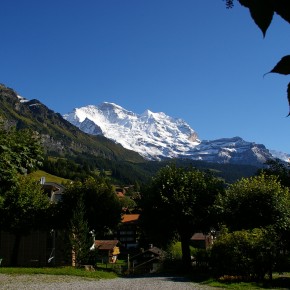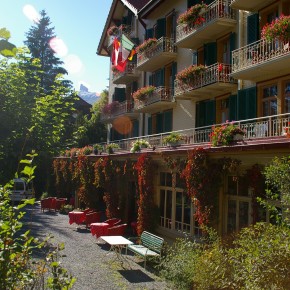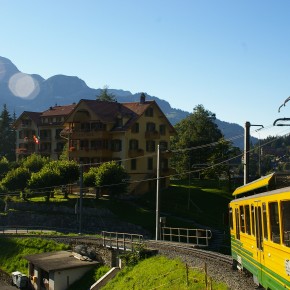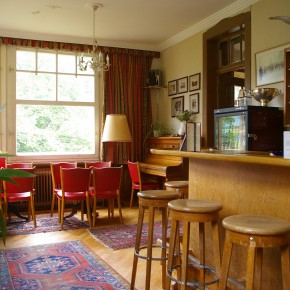Heavenly Pursuits
The rockets explode in continuous blazes of color which seem to illuminate the entire valley. As the whooshes and bangs from the sky above reverberate from the mountains around us, punctuated by oohs and aahs of wonder from the crowds below, our nostrils taste a strange, heady cocktail of gunpowder and damp earth.
The English have fireworks on November 5th; the Swiss have them on August 1st. We light up our skies to commemorate a traitor who tried to light a fuse in 1605; the Swiss light the blue touchpaper to commemorate Swiss National Day. August 1st 1291 marked the beginning of the fabled 700 years of unification and democracy which (according to Orson Welles in The Third Man) had, famously but incorrectly, culminated in that zenith of Swiss achievement: the cuckoo clock.
In fact, part of the wonder of this particular firework display is that it has happened at all. August 1st 1994 had threatened to be a complete washout. Early-morning fog had turned into mid-morning drizzle, which in turn had developed into torrential rain from midday to dusk, punctuated by a firecracker of a thunderstorm at about 4pm. For most of the day it had looked for all the world as though the firework spectacular, scheduled to begin around 10pm, really was destined to be the proverbial damp squib.
This is our second visit to Wengen. We had chosen the resort and the hotel more or less at random from the brochure last year, and such had been our delight with both that we have returned this year for an action replay. Wengen is a small but perfectly-formed Alpine gem, perched halfway up a lush, green mountain high above the Lauterbrűnnen valley. Here, traffic is a distant memory; apart from a handful of electric trucks (used by the hotels for transporting luggage to and from the station), cars are neither permitted nor necessary. The village is accessible only by rail, and is linked to the outside world by a regular procession of boneshaker trains which travel down the mountain to Lauterbrűnnen, Interlaken and beyond, or upwards to Kleine Scheidegg and the dizzy heights of the Eiger, Mőnch and Jungfrau.
Our hotel, the Falken, has been run by the same Italian-Swiss family since it opened 99 years ago. Apart from one or two concessions to the twentieth century (such as the installation of central heating, and a willingness to accept foreign credit cards), little appears to have changed in the meantime. The bedrooms evidently began as chambers séparées (two rooms with an interconnecting door), but are now put to more practical use as family suites. The Falken is one of those enlightened (but alas, all too rare) establishments which do not expect holidaying parents to share a claustrophobic bedroom with their sprogs. Yet the rooms retain a unique ambiance of an earlier age. Ours still boasts its original wood-paneled walls, a built-in Breton-style dresser, and a magnificent, tiled edifice in the corner, which looks like a cross between a samovar and a wash-stand. According to the owner, this used to be a stove, connected to the original kitchens by a complicated network of chimneys, which provided a primitive form of central heating.
The Falken’s dining room oozes a kind of eccentric, old-fashioned, understated elegance – from the snow-white tablecloths and parquet flooring, to the quietly authoritative omnipresence of the maître d’hôtel, Signor Emilio. Black-suited and white-haired, he glides around the dining room, effortlessly greeting the guests in their own languages (we’ve heard him converse in at least four in as many minutes) whilst simultaneously dispensing instructions to the waiters and opening our bottles of Hopfenperle beer with one hand. The food itself appears with the same effortless efficiency. A typical four-course masterpiece might well begin with hors d’œuvres garnished with crisp lollo biondo and radiccio lettuces which were still growing less than an hour ago, followed by a hearty soup carefully crafted to satisfy appetites whetted by the Alpine air. This might be followed by escalopes of veal, pork or turkey served with wild mushroom sauce, rösti and more home-grown vegetables. The whole thing would then be rounded off by a wickedly delicious pudding (one of our favorites was white chocolate parfait, with fruits of the forest sauce).
But on August 1st the food achieves new dimensions of greatness, as the whole of Switzerland prepares for a great national party. This is evident everywhere we look: the stall in Wengen’s main square, dispensing free cocktails to the accompaniment of alpenhorns, accordions and yodelling; the special celebratory bread rolls (baked in the form of a Swiss flag) on sale in every bakery we pass; the houses, hotels and shops decorated with bunting and paper lanterns – and not least the special buffet provided in the evening by the Falken. Six garland-bedecked tables groan under the weight of melon with Parma ham, pâtés, prawn cocktail, Swiss tartlets filled with Gruyère cheese, tureens of soup, boeuf en croûte, honey-glazed roast ham, fish, chicken quarters, rösti, rice, noodles, bowl after bowl of home-grown salads, home-made chocolate mousse, syllabub, gateaux, more gateaux and a gargantuan basket of fresh fruit. Our experience with the gastronomic marathon last year taught us that this is the kind of occasion which one should not attend wearing tight waistbands! All day everyone has been stoically ignoring the rain. Perhaps one advantage of being British is that we can take the vagaries of the weather in our stride.
And now, two hours after the children should have been in bed, we are all perching, stiff-necked and numb-bummed, on a five-day-old copy of The Times, which is doing its valiant best to ease the discomfort of a hard, wet garden bench in the hotel grounds. We have followed the torchlight procession through the town, and have completely failed to follow the obligatory address given by the mayor of Wengen. Swiss German is less than comprehensible at best; this was delivered in an accent the like of which we have not heard since the days of Jim Henson’s Swedish Chef. Now the skyrockets are shattering the heavens, as if trying to compete with Nature’s own firework display in the afternoon, which had immobilized one of the region’s closed-circuit television cameras. The children, their tiredness forgotten, gaze heavenwards in undisguised rapture. From now on, our own firework displays on November 5th will have much to live up to…
September 1994




